Nov 3, 2015
LeBrun: Pronger overcame rough start, injuries to earn spot in Hall of Fame
From a turbulent start in Hartford to a career-ending injury in Philadelphia, ESPN's Pierre LeBrun writes that Chris Pronger has taken the scenic route to the Hockey Hall of Fame.
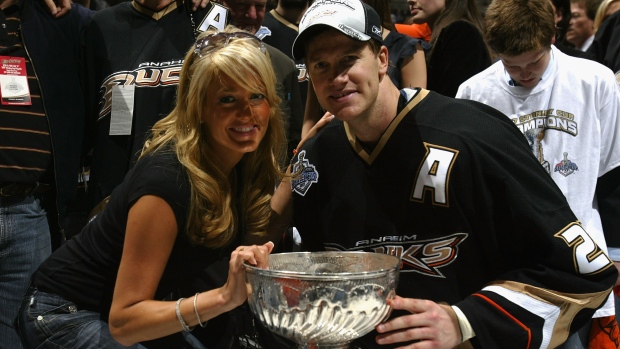
Al MacInnis saw the young man grow into a superstar in front of his own eyes.
"Chris Pronger was the total package," the Hall of Fame defenseman said. "Was there a weakness in his game? When he was in his prime, I certainly couldn't find one."
But it wasn't always easy for the 6-foot-6 behemoth of a defenseman. From a turbulent start in Hartford, to getting booed in his first year in St. Louis, to a trade demand in Edmonton and a career-ending injury in Philadelphia, what has made Pronger's superstar NHL career all the more impressive is that it came while overcome numerous obstacles, perhaps more than most people realize.
"The best things in life aren't easy," Pronger, 41, said during a recent one-hour interview. "My career kind of sums that up. From the start of it to the end of it, there were a lot of twists and turns, a lot of different adversities. Having overcome those, it makes you stronger."
Undoubtedly, it also provided Pronger the edge in his game and persona that made him one of the league's most feared players while also one of its most talented.
It might surprise some that for a player who was certainly an easy choice in his first year of eligibility for induction in the Hockey Hall of Fame, that the man himself had doubts early in his hockey life.
As a self-described "outsider" from a small town in northwestern Ontario, Pronger was not always the confidence-oozing rock star that he would be for so many years during his star-studded NHL career.
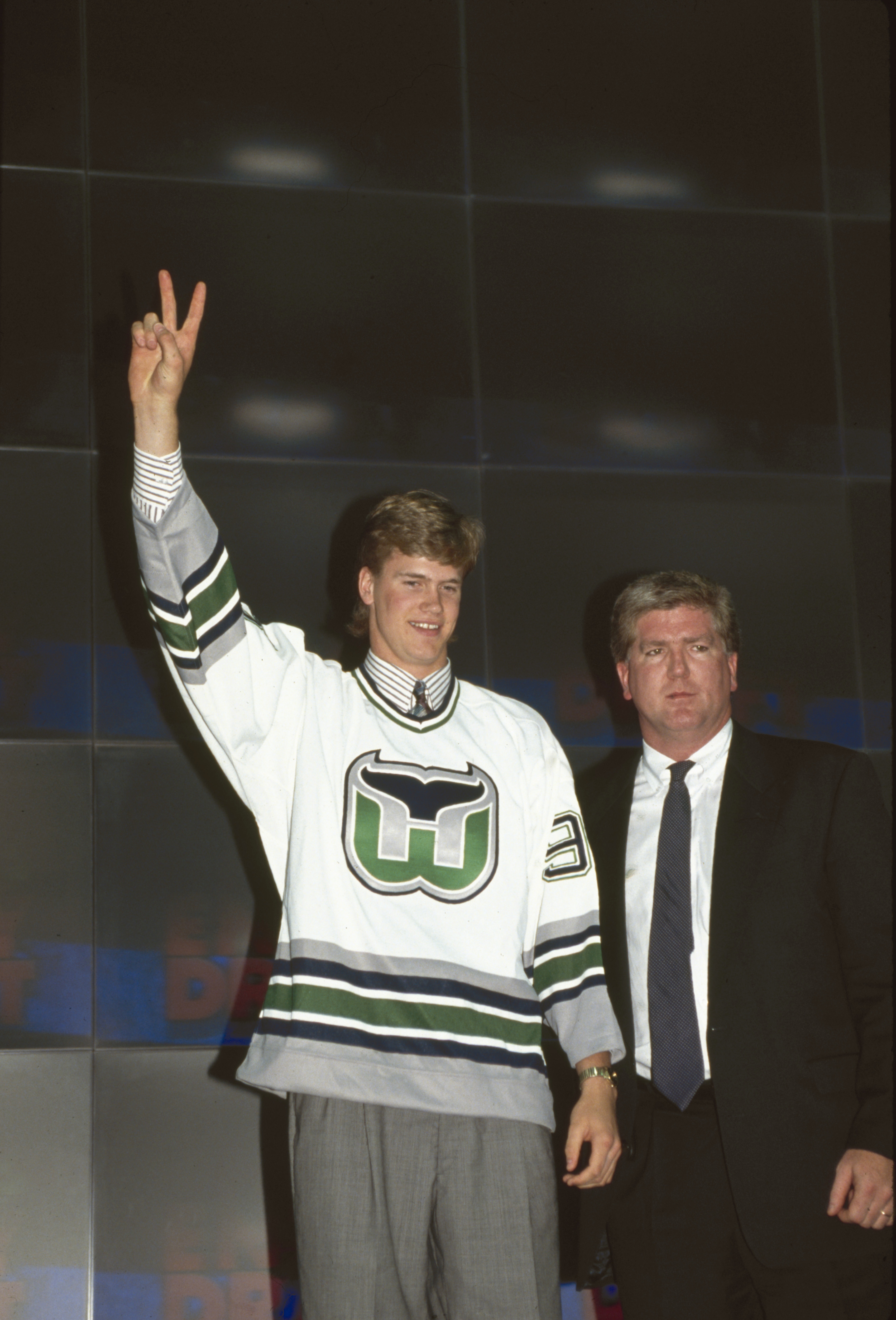
The Early Years
The first thing you need to know about Pronger is where he is from. It helped shape the person he is.
"I'm from the middle of nowhere," Pronger said of Dryden, Ontario, population 7,617 and 218 miles east of Winnipeg, Manitoba. "I had to drive four hours just to find a city. It's a different upbringing. It was perfect for me. I love the small-town feel, where you know everybody. When you get more than three cars at a stop sign, it's a traffic jam," Pronger said, chuckling. "Growing up, I ate, slept and breathed hockey. I got home from school, I shot pucks, played outdoor hockey, road hockey, go home for dinner. ... Remember this is pre-Internet, barely any video games, I had a Commodore Vic-20. If you weren't doing your homework, you were outside playing hockey, most likely."
His hometown's isolation, however, made him feel like an outsider as he made his way up the hockey ranks. His talent early on was unmistakable. But when that meant attending provincial team camps as a 15-year-old or 16-year-old, he was the guy without friends.
"You go to these camps like the [provincial] under-16, I didn't even know any of these names or who the hell they were," Pronger said. "They were all from Toronto and southern Ontario and they all knew each other, they'd played against each other their whole lives. All of sudden you're the outsider coming in, all these guys are buddy-buddy. It was tough, I didn't know what to expect."
As a 15-year-old leaving Dryden in 1990 to play junior B hockey 1,079 miles away in the southern Ontario town of Stratford, Pronger was homesick.
"In the beginning, it was hard," Pronger said. "While the hockey is going on, your mind is consumed, you're fine. Once hockey was over, I had to get out. I went back home to finish school. That's the only time I was ever homesick. Once I got to Peterborough the next year, I was fine."
Pronger took the Ontario Hockey League by storm with the Peterborough Petes in 1991-92 and 1992-93, putting up a 62-point season followed by a 77-point season. Stardom was written all over him.
That he chose to go the Canadian major junior route wasn't an automatic decision, however. "My brother went the college route and I just assumed I would play college hockey, too," said Pronger, referring to former NHLer Sean Pronger. "That was the route I was on. But for whatever reason, Peterborough was able to talk to me into going at least to camp, at least to try it."
What he realized once he got to Petes' camp is that he needed to stay to test himself against the best available competition. Going to a U.S. college would have meant another season in Stratford because he had another year of high school to complete and another junior B season at that point seemed "two or three steps back," Pronger said. At the time, Pronger heard from colleges such as Bowling Green (where brother Sean played), Michigan, North Dakota, Maine, Michigan State, Denver ... "pretty much all the name hockey colleges."
"I actually can still remember the conversation we had in our basement," Sean said. "It was me, my dad and Chris. He had just been drafted by Peterborough. I remember telling my dad I thought Chris should go major junior. Any other circumstance I would say college, but in his situation, it was a no-brainer when you realized what Peterborough had to offer. Obviously, it worked out fantastic."
Major junior hockey it was.
Chris Who?
It is hard to fathom now, but Pronger went second overall to the Hartford Whalers in the 1993 draft behind Alexandre Daigle, a Quebec junior scoring sensation taken by the expansion Ottawa Senators. To be fair, people easily forget Daigle was indeed the consensus No. 1 pick, an offensive dynamo whom scouts were universally comparing to Joe Sakic and Pat LaFontaine.
"I'm glad I got drafted first, because no one remembers No. 2," Daigle would famously say to reporters that day.
Oh, boy.
"I think when you look at the quote itself, part of it was his so-called brashness at the time, but also part of it was his lack of English at the time," Pronger said. "He was probably trying to figure out a quote and said it. It's always nice when people say stupid comments like that because it adds a fire, you use things like that to push yourself."
Daigle never did live up to his top-pick billing, and after bouncing around for 600-plus NHL games, ended his playing career in Europe.
Not that Pronger had it easy right away either.
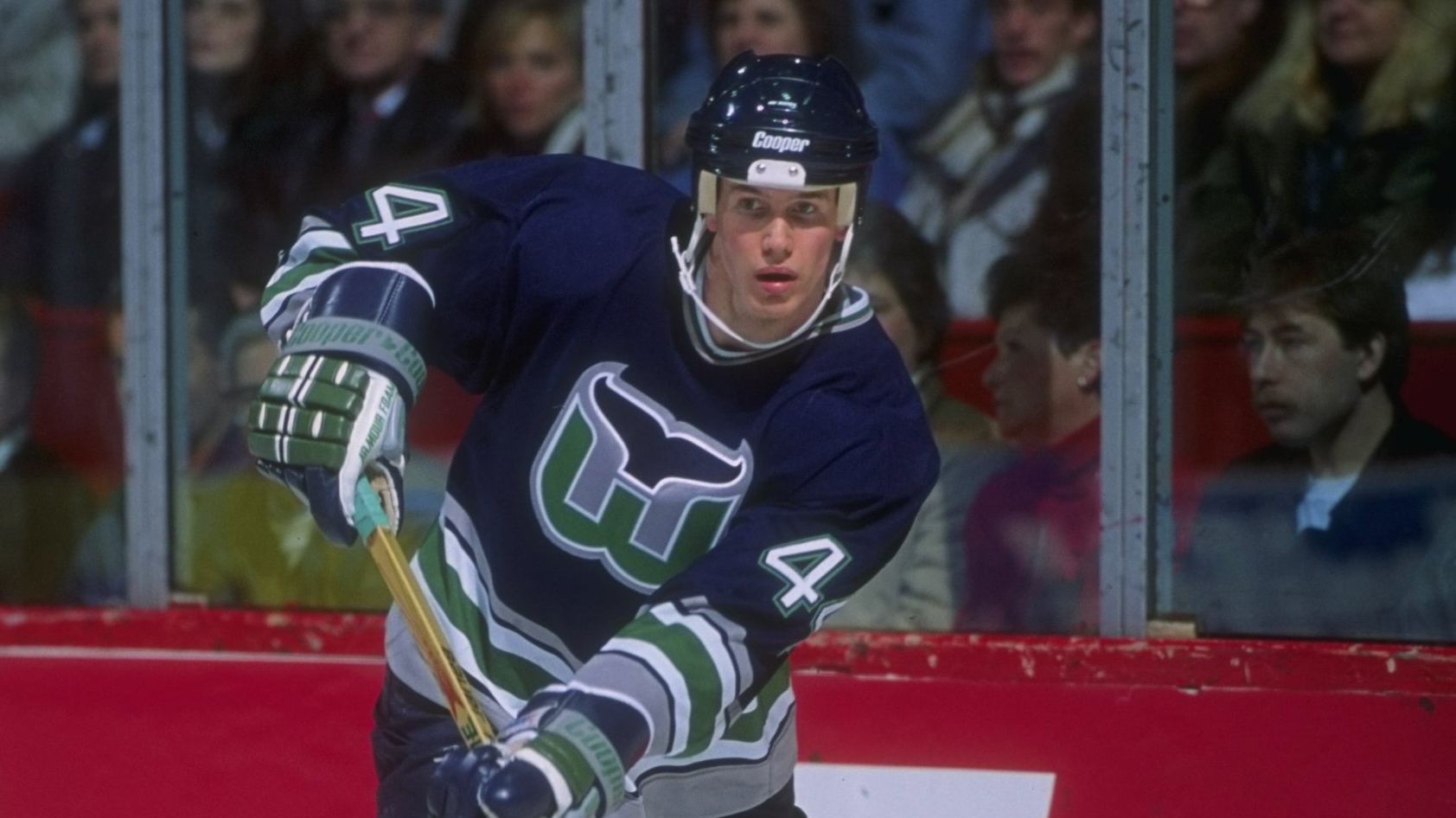
Whaler Days
Pronger made the NHL all-rookie team, although it was an interesting first season, to say the least. Brian Burke -- who drafted Pronger -- left his job as Whalers GM before the season started, leaving head coach Paul Holmgren to tackle the GM duties, too.
There were ownership issues as well, which eventually would lead to the sale of the team after the season.
"There was so much going on that first year," Pronger said.
Plus, as Holmgren recalled, just getting Pronger signed before the season was a close call.
"Those were the days when you had a deadline when you had to have a guy signed by a certain date in training camp," Holmgren said. "We were getting right down to the wire. I'm talking to Mr. Gordon, the owner, he asked me what I think, I said, 'Not only is he our best defenseman, he's probably our best player.' At the end of the day, we signed him in what was probably a midnight deal. We got it done. He was a good player that year. A lot of the qualities that he carried out throughout his career were evident that first year: great poise with the puck, he could slow the game down, control the game with the puck and without it because of the way he played, because of his hockey sense and vision. Obviously, he had a lot of growing up to do physically, but he was still a good player as a skinny teenager."
For Pronger, it was a good season on the ice, although the adjustment off it wasn't easy.
"We had a good group of guys, but they were all older, lots of them had families or just getting married, and here's this 18-year-old kid doing nothing," Pronger said. "All this idle time where you're not doing anything. The first year was tough, I'm not going to lie to you. I lived with a family my first year, they became a second set of parents for me, great people. But it was a tough year. The NHL back then was a veteran league, very few kids on teams. So different now. It was a learning experience, obviously a few mishaps along the way. But from a hockey standpoint, it was decent start, not a great start, but it was OK."
The "mishaps" included Pronger being arrested along with five other Whalers during a barroom brawl in Buffalo, as well as a drunk-driving arrest a few days after the season ended.
One teammate Pronger won't ever forget, though, was the late Brad McCrimmon, who took the youngster under his wing and showed him the ropes.
"You need a veteran presence like that to help school you and bring you along and teach you how to be a professional," Pronger said. "I roomed with him on the road, he was my D partner. I spent every waking minute with this guy, who was old enough to be my dad. He left a lasting impression on me. A lot of the things I do today I say, 'This is what Beast taught me.' Some good, some bad," Pronger said, chuckling.
"To have somebody like that that to learn from, it was huge."
In the summer of 1995, after Pronger's second season in Hartford, Holmgren -- now just the head coach -- was dispatched by management to go check on Pronger in Dryden.
"He came up to visit me and see how I was doing, we went fishing, talked hockey, he was making sure I was working out and all that," Pronger said. "We finish fishing, I get him to the airport, he calls in to the office and [GM Jim] Rutherford tells him he had just traded me."
Recalled Holmgren: "My response was, 'Oh, boy.' [Rutherford] goes on to tell me it's for Brendan Shanahan. I think they already had the deal made. Certainly, by the time I got back to Hartford, it was made. Chris and I had a few laughs about that over the years. All those years after, I would still get Christmas cards from Chris. We remained as close as can be when you're not working for the same team."

Off to St. Louis
The reality is that the move to the St. Louis Blues was a fantastic one for Pronger.
"Absolutely," he said. "It gave me a chance to go to a team with bona fide superstars on it, guys that you can learn from. I get to play behind Al MacInnis and learn from him. I get to play with Brett Hull. There were like six or seven Hall of Famers that I would play with during my time in St. Louis. I mean, Wayne Gretzky was traded there my first year."
Still, that first season or two in St. Louis was tough -- the fans were on him because he was dealt for a fan favorite in Shanahan.
See a pattern here?
"Again, nothing came easy in my career," Pronger said. "I always got to have a boondoggle in there somewhere."
Said MacInnis: "Chris is a smart guy, he realized who he was traded for."
"I'll give him a lot of credit," MacInnis added. "He was a young guy, he was in a tough spot. I don't hear it very often but there were times when the fans here [in St. Louis] got on him a little bit. There were times when the coach at the time, Mr. Keenan, was extremely hard on him. But he was able to build some tough skin and some mental toughness to push through. And he became a heck of a player. I'm not sure how many guys would have pushed through, but he certainly found a way."
Pronger wonders, too. Coach Mike Keenan rode him hard.
"That first year was very difficult. I was the whipping boy," Pronger said. "I was in his office after every period, before and after every practice. I was beaten down. I think between getting booed every night and getting abused by him, I had no confidence whatsoever. ... I got to a point where I saw a sports psychologist."
Keenan, via email, defended his treatment of Pronger.
"Chris was involved in a major franchise trade," Keenan wrote. "He was very young and needed direction. I treated him with a very firm hand and also asked his parents for support. He became an elite player in St. Louis and won the Hart Trophy. He was a player I really respected."
Eventually, Pronger just grinded through it.
"It was a matter of turning the page and not worrying about expectations and what people think," Pronger said. "Just read and react and play the game. Just leave it on the ice and don't worry about it. You can get bogged down in thinking, 'Why don't people like me?' You can dig yourself a hole."
He turned the page with the 1996 playoffs, when he put up six points (1 goal, 5 assists) in 13 games and had a big presence at both ends of the ice.
"I remember that as being his coming-out party, the series against Detroit," says his brother, Sean. "From there, he never took a step back for the next 16 years."
MacInnis, through it all, was a positive influence.
"Just being able to watch a guy like that," Pronger said. "We started working out with the same trainer. Being able to watch and see his preparation and how he goes about his daily business. You can learn an awful lot when you're watching good people like that go about their business."
MacInnis humbly downplayed his role.
"He was a young guy that was looking for a bit of advice and guidance. I didn't do a whole lot, I tried to steer him in the right direction as far as a personal trainer goes," MacInnis said. "From there, he took ownership. He worked extremely hard off the ice, got himself physically stronger, made a huge commitment, got himself in top shape. Obviously, that helped him immensely in becoming the player that he became."
In 1999-2000, it all came together and then some for Pronger, with a career-high 62 points and a ridiculous plus-52, netting him not only the Norris Trophy as the NHL's top defenseman but the Hart Trophy as league MVP.
"Think how many defensemen have ever won the Hart Trophy," MacInnis said. "In the last 40-plus years, there's only been two defensemen to win the Hart Trophy: him, and a guy by the name of Bobby Orr who was pretty good, too.
"When Prongs won it, I don't know that anyone could argue he wasn't the most valuable player in the league."
The Blues had some good teams during Pronger's nine seasons but regular-season success didn't translate into postseason glory, the Blues failing to get over the hump come spring time.
By the time the 2004-05 lockout wiped the entire season, change was on the horizon.

Edmonton for Just One (Heck of a) Year
Pronger said he's not entirely sure why the Blues put him up for auction; he suggests perhaps there were bad feelings about the lockout when he was an outspoken voice on the players' behalf. The story most often repeated is ownership was unwilling to pony up for a new contract for the superstar blueliner.
Either way, word was out.
"The stories were out there that they would have a tough time signing him," former Oilers GM Kevin Lowe said.
So, Pronger was dealt to the Oilers on Aug. 2, 2005, for Eric Brewer, Doug Lynch and Jeff Woywitka.
"I was shocked it was Edmonton," Pronger said. "I knew [the Blues] were trying to trade me, and my agent had told me the handful of teams that were kind of in the running. And at no point did Edmonton ever come up. Ever. And then out of the blue I get a call to say I was traded to Edmonton, I said, 'I'm sorry, what?' But you know, it was a young team with promise, certainly that was the sell. I certainly enjoyed playing there with those guys, we went on that run. It was a heartbreaker in Game 7."
Said Lowe: "I wish he had been around longer. But he was a hell of a player for us."
Pronger put the underdog Oilers on his back and carried the No. 8 Western Conference seeds all the way to within one win of a Stanley Cup championship, along the way putting up 21 points (5 goals, 16 assists) in 24 games in one of the most impressive playoff campaigns of the modern era.
Not to take anything away from Carolina Hurricanes goalie Cam Ward, who won the award as his Hurricanes won the Cup, but to this day it remains stunning that Pronger wasn't voted the Conn Smythe Trophy winner as playoff MVP.
"I thought he should have won it as well," said Mike Peca, a member of that Oilers' team that season. "Cam Ward certainly made a case for himself. But from Chris' perspective, the true mark of great players in any sport is they make those around them better, even if they're not on the ice. Chris made our team better even when he wasn't on the ice, that's because of the way he carried himself and the confidence in which he did that, the confidence which he instilled in the players."
Pronger's performance that season left a marked impression on Peca.
"I had played with him on the Olympic team in Salt Lake, but to play with him an entire season and have that Cup run in Edmonton, it was a great privilege," Peca said. "It really makes you aware of how great he was."
Very few people knew at the time Pronger was having arguably the greatest playoff campaign of his career at a time when he knew his Oilers days were numbered, having quietly asked for a trade earlier in the season, citing family reasons. Pronger's wife, Lauren, is from St. Louis and the move to Edmonton wasn't going well.
Pronger, however, did not let it affect his play one iota.
"He played incredibly well and was the consummate pro," Lowe said. "That trade request had come around Christmas or something. It clearly wasn't something that was to be done immediately but [he] just wanted us to know. ... But I always hoped once the hockey got better and once everyone settled in, maybe it would change, especially after he saw how great the fans were after a run like that. But it might have been about an hour after Game 7 ended when I saw [Pronger's agent] Pat Morris and he reiterated that the request was still there. That was tough. Not many people knew and for me as a manager, going through the playoffs and knowing that that was there ... it was tough."
Pronger, looking back, agreed that maybe the Oilers didn't resist his trade request because he went out and played his butt off for them after the demand.
"The trade request was not going to affect how I played the game," Pronger said. "Just play the game the way you know how. Let the suits deal with the other stuff. It's out of your hands anyway. I'm getting paid to play the game. ... Each and every night I played the game to my best abilities and left it all out on the ice. I knew they didn't want to trade me, but at the end of the day, it just wasn't working out."
Lowe and the Oilers brass identified potential suitors. While the former Oilers GM would not disclose them, other sources indicate he spoke to the San Jose Sharks, Florida Panthers, Philadelphia Flyers, Toronto Maple Leafs and, of course, the Anaheim Ducks.
On July 3, 2006, Pronger was dealt to the Ducks in exchange for Joffrey Lupul, Ladislav Smid, two first-round picks (one of which the Oilers used to draft Jordan Eberle) and a second-round pick.
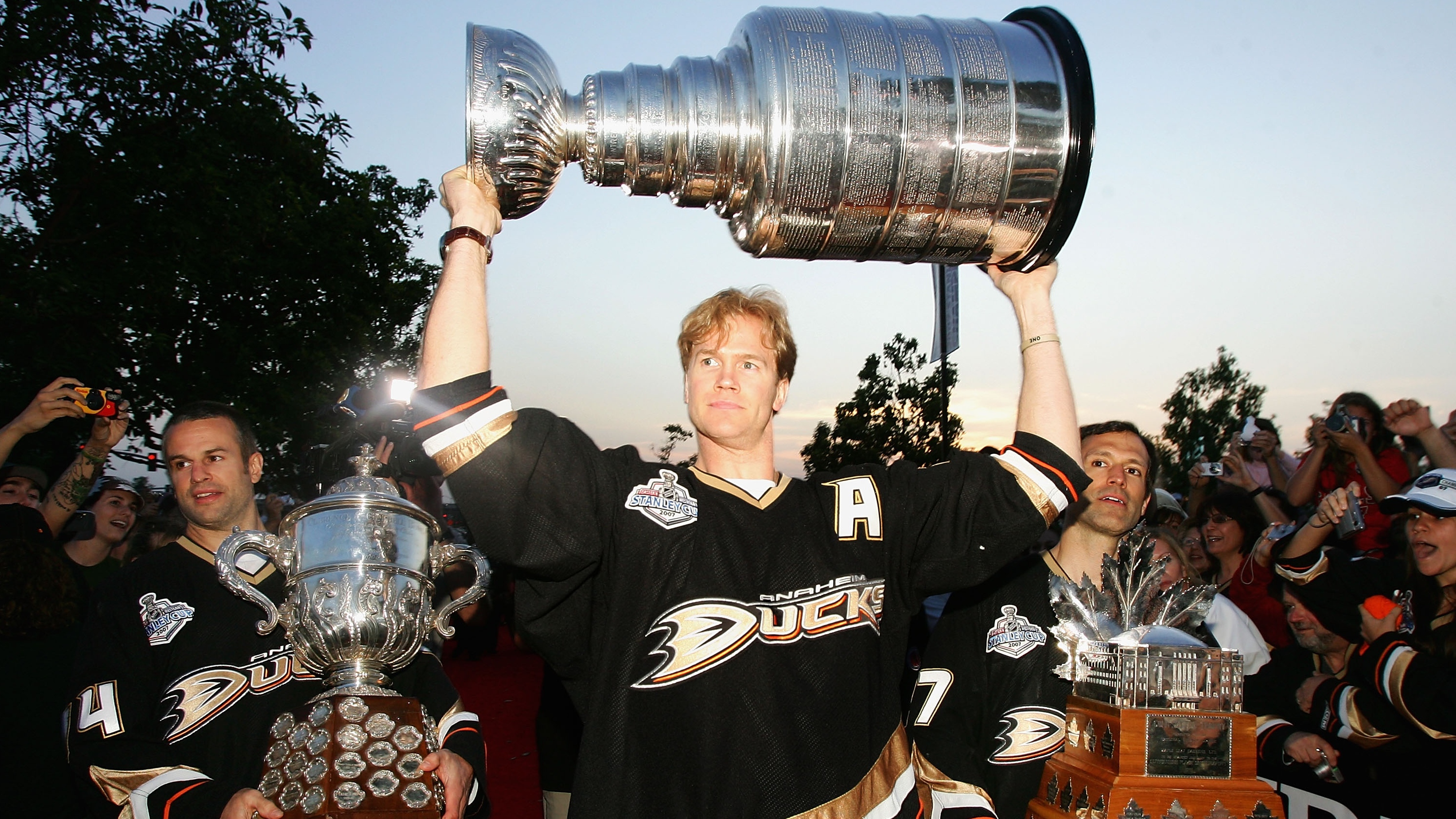
Finally, a Cup
In Anaheim, Pronger was thrilled to be joining a true contender.
"I was excited, we had just played them in the conference finals and I knew what their team was all about," Pronger said. "They had a lot of young players, some good veterans on the back end, it was a team on the rise looking to make that next step."
Fellow Hall of Famer Scott Niedermayer recalled his own reaction after the Pronger deal.
"Pretty big moment, I remember when I heard we had traded for him," Niedermayer said. "I hadn't really heard any rumors up until that point, so I was like, 'Wow, that's a big move.' That got everybody excited."
Led by Niedermayer and Pronger, an unreal 1-2 punch on defense, the Ducks were dialed in from start to finish on their quest to win their first Cup in franchise history.
"It's exciting to be part of a team that has Stanley Cup-or-bust expectations," Pronger recalled. "All year long, it was a mindset. Every guy in the room bought in. We just went about our business. When you have that kind of belief and mindset, anything is possible."
A five-game Cup final series win over the Senators allowed Pronger to achieve the dream of every single child who has ever carried a hockey stick.
"When you're a kid and you're outside shooting pucks, or you're stickhandling around your brother in the basement and it's five seconds left for the win and you win a Stanley Cup, all the things you're doing as a kid growing up, it's always a lifelong dream to win a Stanley Cup," Pronger said. "You always talk about winning your last game. I came so close the year before with Edmonton and to be able to get right back there and help seal the deal with the Ducks and finally win, that was a euphoric moment. You're doing it for yourself, you're doing it for your team, you're doing it for your family, your family's name is going to be on the Cup forever. It's pretty special to be part of that small group."
Pronger also left an impression on Niedermayer during their time together.
"Chris always amazed me how crisp his passes were, always right on the tape, the right play and rarely turning pucks over," Niedermayer said. "He could defend as well as anyone with his intensity, his size and his smarts."
Anaheim would have been a good place to stay for good. Pronger enjoyed it there but another trade was on the horizon, two years later, in the summer of 2009.
"They started getting rid of guys," Pronger said of the Ducks. "I was a little miffed myself. But hey, whatever, that's not my job. My job is to play. I started hearing rumors and I said, 'Hey, are you trying to deal me?' So I said, 'Fine, move me.' "
Pronger was due a new contract soon and the Ducks weren't going to put up that kind of money; or perhaps new GM Bob Murray simply felt the hard miles on Pronger were soon going to take their toll.
Whatever the case, he was dealt to the Flyers on June 26, 2009, with Ryan Dingle in exchange for Joffrey Lupul (yes, again), Luca Sbisa, two first-round picks and future considerations.
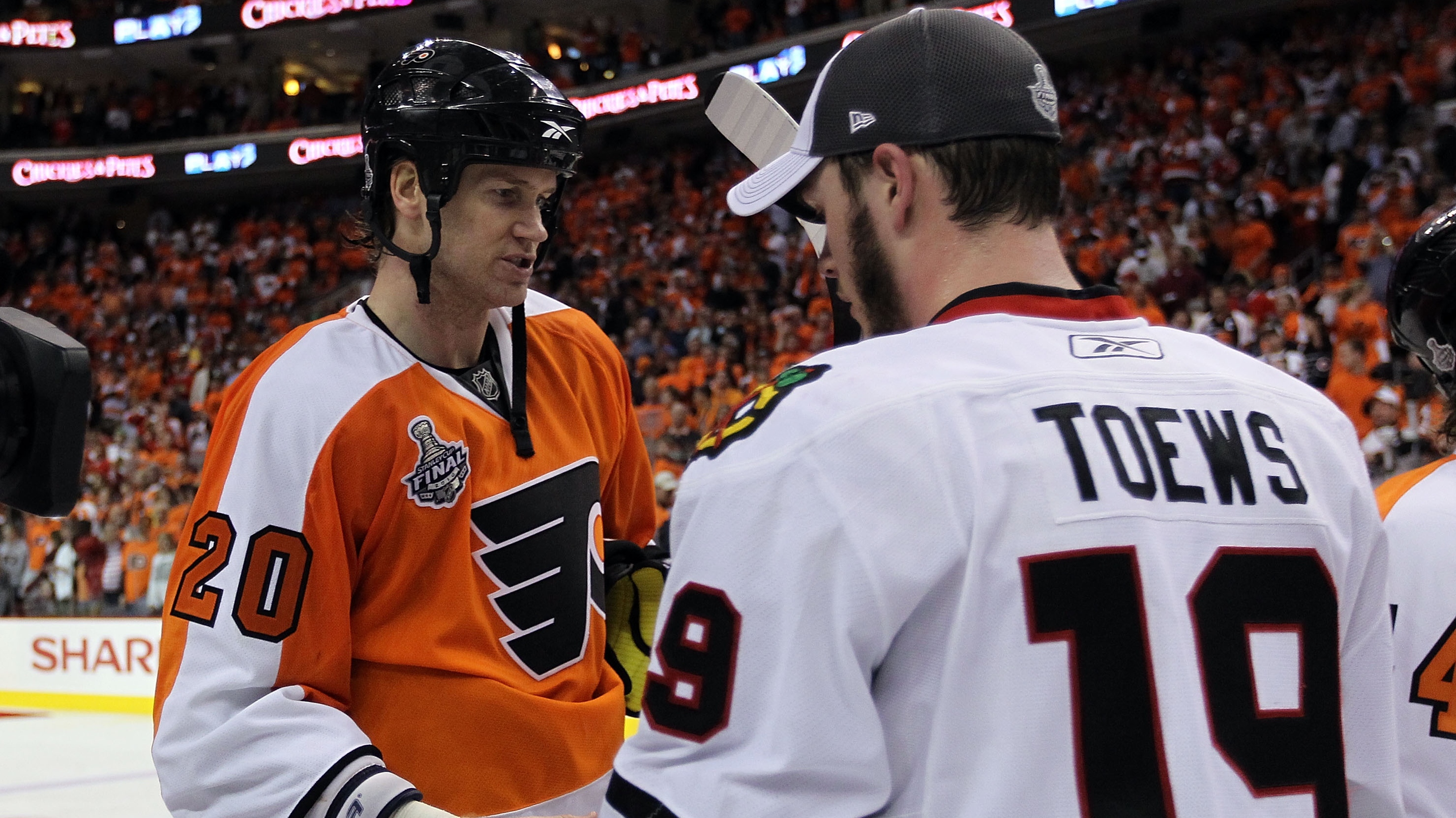
Reunited with Homer
In Philadelphia, Pronger was back together with Holmgren, the Flyers GM who 16 years earlier was his first NHL head coach. "It always comes full circle," Pronger said.
"We paid a big price for Chris, but I think it was worth it," Holmgren said. "We still got one of the best defensemen in the game, a guy that could control the play at both ends of the rink. His leadership on our team was important, he helped a young Mike Richards along those lines. So, he was a very good player for us."
In 2010, Pronger's first season in Philadelphia, the Flyers squeaked into the playoffs and made it all the way to the Stanley Cup finals before losing to the Chicago Blackhawks. Again, Pronger was a postseason monster.
"When we made that trade, we had just played the Penguins two years in a row and we thought, well, they're going to have [Sidney] Crosby and [Evgeni] Malkin forever, if we could just add one more top defenseman," Holmgren said. "We had Kimmo [Timonen] at the time, and a decent supporting case with [Brayden] Coburn and [Matt] Carle. If we could get one more guy, we could be more competitive with the Penguins."
Sadly, it would be the last great moment of Pronger's career, his career halted prematurely only a year and a half later by concussion issues and an eye injury. He was only a year and a half into a seven-year extension he had signed with the Flyers, a contract the Flyers honored.
It's not just that, Pronger said, but how the Flyers dealt with him after his injuries that he has so much respect for them, especially Holmgren and owner Ed Snider.
Holmgren made sure Pronger had everything he needed during this difficult period, while also beginning to open the door to life in hockey after his playing career, including Pronger's front-office life.
"To have his support and friendship and help, he was always asking me what I needed, what I wanted to do. I was able to bounce questions off him," Pronger said of Holmgren.
"He was so sincere. For anybody who has gone through it to have somebody to have your best interests at heart, it speaks volume to his character. Had I been somewhere else, who knows what would have happened? I was making a lot of money and wasn't playing. You can just imagine what the GM and owner are feeling. You're stuck in the abyss and not knowing what's next."
It wasn't the way one wants to end a Hall of Fame playing career. But again, Pronger's career was full of curveballs, right?
"The best things in life aren't easy. My career kind of sums that up," Pronger said. "From the start of it to the end of it, there were a lot of twists and turns, a lot of different adversities. Having overcome those, it makes you stronger."
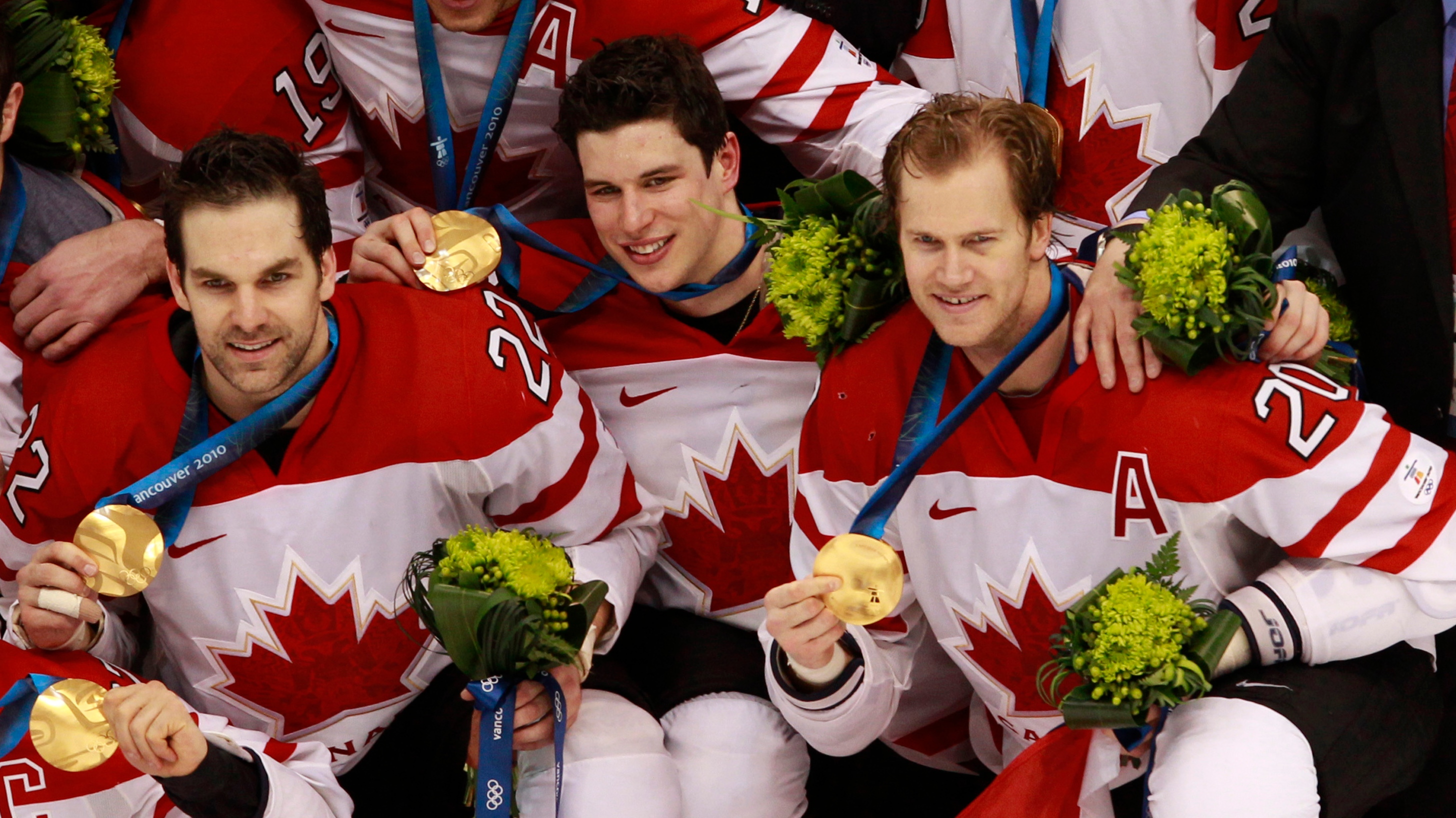
Team Canada
Much like his entire career, Pronger lived through both adversity and the ultimate glory while wearing the Maple Leaf of his country, twice (2002, 2010) winning Olympic gold but also feeling the heat of the Nagano disappointment in 1998 and the Turin disaster in 2006.
Such is the life of playing for Team Canada, where only gold matters.
"I think the pressure after Nagano -- and people there thought we were mortal locks to win -- the pressure kept mounting," Pronger said. "The difference between 1998 and 2002 is that we were getting better with every game in 2002.
"To get that monkey off our back in 2002 ... and the way we did it was special. We got crushed in our first game, Sweden takes it to us, everybody writes us off, Gretz comes out and takes the brunt of everything while we're trying to figure out how we're going to play. We systematically got better with every game, we came together as a group and as a team. We really bonded, culminating with that [gold medal] game against the U.S. What better team to win against than the U.S. to get our 50-year monkey off our backs?"
His last international experience was gold at Vancouver, a perfect way to end things in a Team Canada sweater.
"There was a lot of pressure on our team," Pronger said. "You look at the debacle we had in Italy in 2006. Then to have the changing of the guard for 2010 with Sid and [Jonathan] Toews and [Duncan] Keith. You see the wholesale change that's going on with Hockey Canada. But there was pressure at home for sure.
"That belief, again, in the locker room, and with each game we could feel our game getting better and better."

Pronger Today
Pronger isn't going to pretend he doesn't see the irony in the fact he's now part of the NHL's player safety group, advising Stephane Quintal on player discipline.
This from the man who was suspended eight times in his NHL career.
"Oh, yeah. I'm on the calls with these guys and I'm watching the play thinking, 'What would I have done?' " Pronger said. "But I'm there in a supporting role, just giving my opinion. I'm not the rule-book guy, I'm the hockey guy. I just give my opinion on certain plays."
Pronger doesn't apologize for the way he played, even when it crossed the line. It's that edge that made him what he was.
"I tried one time, to not play with that intensity and passion, just to see," Pronger said. "I just wasn't into the game. I played a couple of games like that and I wasn't effective. I'm not as effective without that fire and passion and emotion. A lot of times it works out and occasionally it doesn't."
Of course, he has paid a physical price, too. As in 14 surgeries during his career: one on his right foot, three on his right knee, two on his left knee, three on his left wrist, three on his right hand, one on his back and one on his jaw.
And that's not even counting the eye and head injuries that ended his career.
"I'm doing OK. My eye is my eye, it's almost four years later now, it is what it is," Pronger said. "I have to wear glasses, but it's not getting worse. Certain things affect me a little bit, but nowhere near where I was. I get symptoms every once in a while, more eye-related than concussion-related, but like anybody else, you get good days and bad days."
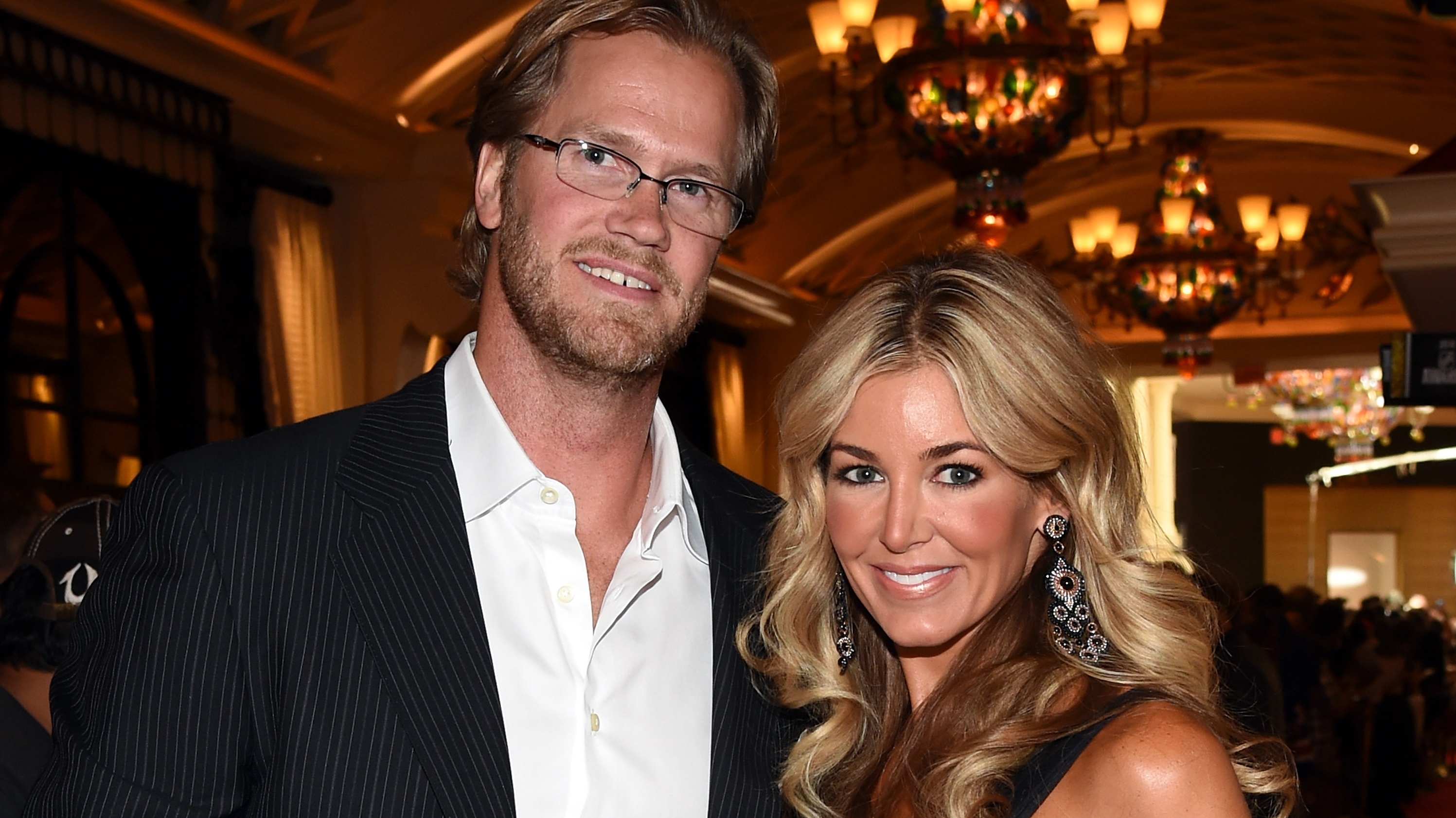
The Future
No question Pronger has interest in being an NHL GM one day.
"Yeah, I would like to," he said. "It's something that I've always been very interested in. I think there's still a lot to learn. That's one of the reasons why I have the job I have now, is to be a fly on the wall and soak up a much as I can, learn the business side of the game.
"I don't know when the right time is or when the right opportunity will present itself, but I certainly would welcome the opportunity."
Holmgren says he feels Pronger would be a natural.
"There's no question in my mind that whatever he wants to do in hockey down the road, whether it's general manager or president or something, he's just too smart, he's head and shoulders above a lot of people in the game in terms of his vision," Holmgren said. "He's got a great hockey mind. In my mind, there's no doubt he will run a team at some point down the road."
Not bad for a kid from the middle of nowhere.

